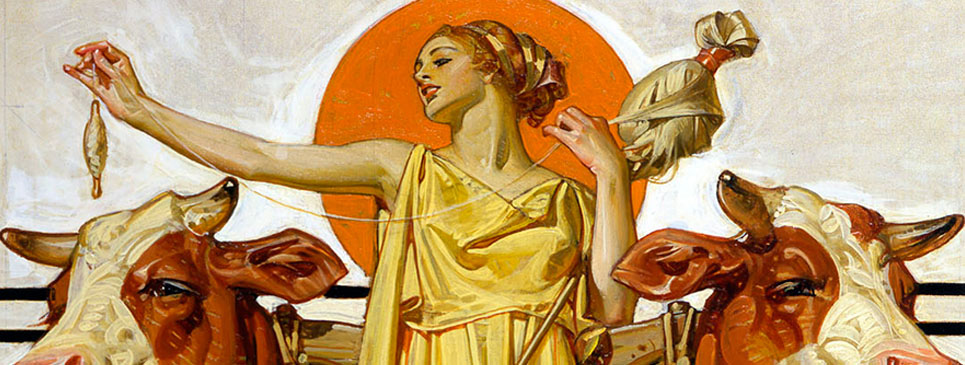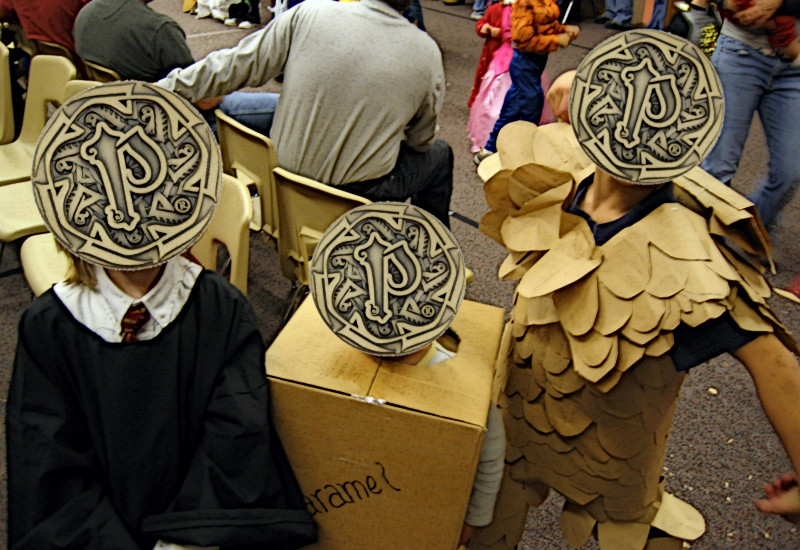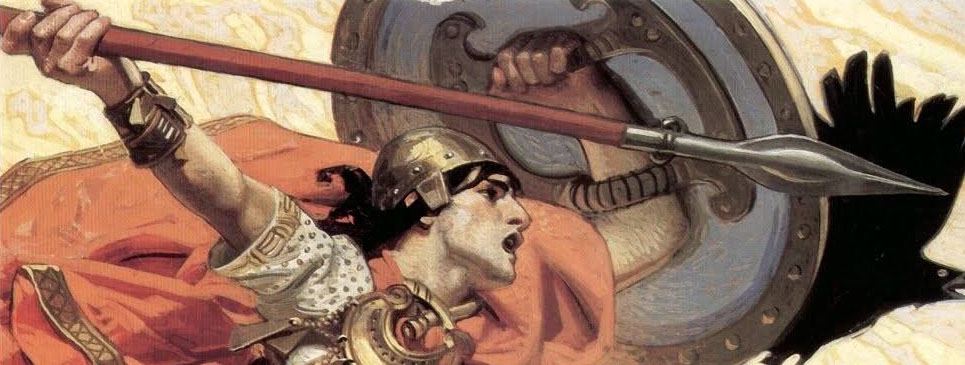Welcome back to Phantasmal Killer, a blog delving into weird and fun game mechanics and how you can take advantage of them to bring new ideas to life at your tabletop. In each article I look at using a game system in unexpected ways to create unique or bizarre characters to pummel your players.
Religion is an important aspect for fleshing out your campaign worlds, especially worlds with an interactive mythology—one where the gods might come around and break your windows every so often. Religion can be even more important to certain characters; classic fantasy gaming gives us tropes like the charitable cleric, the steely-nerved paladin, and the ascetic monk, all of whom draw their power and a certain amount of their identity from their faith. In many cases, class features—such as unwavering courage or magic spells—are described as coming from that faith. And any character may have a close relationship with their god regardless of class. The devout might pattern their morality after their religion, chip in their time to worthy causes in game, and contribute a percentage of their treasure to alms, offerings, sacrifices, or other material gifts in honor of their faith.
But what if you want religion in your setting to be something bigger than an individual player’s powers and choices? You could always flesh out the church structure and present officials a priest or congregation is beholden to, or downtrodden masses upon whom they can unleash their virtues.
Bigger.
You have a world where the gods shaped the planet, created entire breeds of monsters out of spite, and crafted the most powerful artifacts! And they haven’t just sat back since then, either; they still hand out personalized spell lists to every cleric, every paladin, and maybe the occasional warlock, ranger, or oracle!
The hallmark of divine involvement is the miracle: an act by a god on the behalf of one, specific hero. It’s not a thing a player character can control; you can’t force a miracle. But when they happen, you know the eyes of your god are upon you and that your quest is righteous. For a character built to emphasize their religion, there is no bigger culmination of their narrative development!
But don’t miracles throw all the rules out the window? How can you possibly adjudicate them fairly in a way that doesn’t snub all the sacrifices a faithful hero makes but doesn’t blow your game balance apart like a holy hand grenade?
That’s what the spreadsheets are for…
Piety and Charity
You always have the option of handling your miracles as story elements that come out at the pivotal moment in a campaign, but not all miracles are flashy displays of divine fury against a wicked foe. Some are as humble as extended meager resources to last longer than expected. Others are intuition or insights or prophesies. Deciding what miracles a god might perfect on behalf of a single character can be difficult; gods are too busy to invest all their time and power into a single worshipper unless they’ve done something REALLY impressive.
If you want to use the existing rules for game balance to help negotiate what miracles a god might perform on behalf of a her, then consider tracking their Piety and Charity.
Piety represents how deeply into their well of power a deity is willing to reach on behalf of the hero when they notice their need. Piety is an easy measure of how godly (or evilly, for dark gods) a character acts, on a 1-10 scale. Simply being a practicing member of a faith is enough to earn a character’s first rank of Piety, but each new rank after that requires increasing acts of selflessness, compassion, and faith (or increasing greed, wanton cruelty, and destruction for evil characters), and generally comes down to accomplishing or creating something in your god’s name that leaves a mark on the world. You can decide the specifics yourself, but it generally shouldn’t be possible in a level-based game like D&D or Pathfinder to earn more than 1 Piety per level. If a character’s faith lapses or they act against the tenants of their religion, then they lose one or more ranks of Piety and must make amends before they can begin earning more.
Charity represents how invested a god is in the hero and how frequently they check in on them. Tracking Charity involves more math than Piety; you’ll want to record how much gold or other resources a hero invests in good works. If they tithe 10% of their income to a charity or the church, track that amount. If they spend downtown helping the poor, track the charity they earn as if it were money earned at another task. If a hero freely surrenders an artifact to the church without a reward in return, add the item’s gold value to their charity. Like Piety, Charity can be lost or even wiped out by a hero acting outside the tenants of their faith, so a lawful good champion shouldn’t give to needy orphans expecting a divine pass on other crimes.
Miraculous Works
Knowing a hero’s Piety and Charity makes it easy to put miracles into effect. Treat the Piety rank as the effective level of power of the magical effects a deity will create and their Charity as the funds available to “buy” that magic effect. In a game like pathfinder of D&D, this most easily translates into spell levels/item levels and their GP cost. The most common “item” purchased by a character’s faith will be scrolls—single castings of a spell—but the effects of any single-use magic item are appropriate miracles. The faithful character’s devotion is essentially purchasing scrolls on demand.
Miracles using this technique have a lot of benefits: It gives a character access to almost any spell, provided they have lead a pious life and given freely to important causes. Spells from any spell list may be appropriate, depending no the circumstance, and a miracle may provide a much-needed divine spell a cleric didn’t have the foresight to prepare. A miracle might also offer enormous scale. A cleric who wants to feed a caravan of starving refugees might only be able to cast create food and water once a day to conjure 45 pounds of food, but a cleric with Piety of 3 and 10,000gp of Charity save up could pray for a miracle and create enough food to feed 300 people.
The obvious down side of miracles is they take away all control of how and when a worshipper’s resources are applied. The Gamemaster decides if a situation warrants divine intervention or not; a hero’s god may decide they must rely on their own tenacity and wit, or may simply not be paying attention in their hour of need. The Gamemaster also describes what effect the miracle provides, so even if it does happen, the results might not being what the player expected; someone praying for an end to plague might receive visions of the cure (a locate object spell) or learn that it’s being caused by a demon somewhere in the city rather than getting the mass application of cure disease he hoped for.
Heresy
The down side of getting your god’s direct attention is the added scrutiny and micro-management it brings. Rather than simply losing Piety and Charity for acting badly, a Gamemaster might instead a sufficient crime constitutes Heresy and draws down a god’s ire! Heresy is a divine punishment handed down exactly like a miracle. Heroes with a higher Piety elicit more powerful reactions—their gods are more invested in them and more disappointed by their failures—and the magical effects Heresy generates are drawn from their Charity budget.
Thanks to their close relationship with their god, heroes automatically fail any saving throws allowed against spells brought down by their Heresy.
The punishment for Heresy might not target the heroes directly. Just as often it may afflict their family or their community.
Final Thoughts
Obviously this system is primarily aimed at games like Pathfinder, Dungeons & Dragons, and other fairly traditional tabletop games that rely on tracking resources, but the basic ideas can be translated easily to other systems by looking at what a character invests into their displays of faith and reserving it for later.
If you use the system of Piety and Charity, it may often be better to keep the system and its mechanics a secret from your faithful characters and their players, leaving some of the magic in the sudden and wondrous intervention from the gods.







